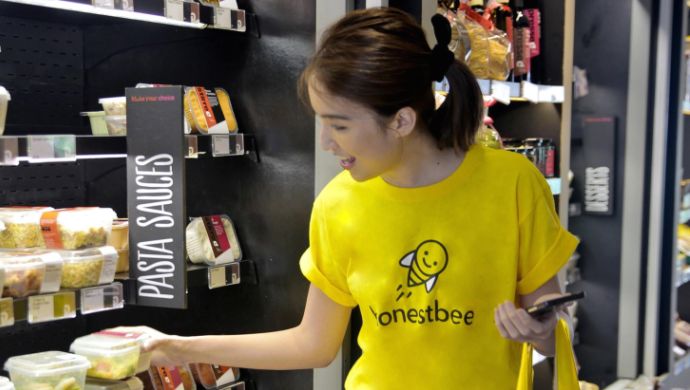Adding laundry service to the platform could potentially increase the value of the network as the platform becomes more useful, thereby increasing return customers

Singapore-based concierge grocery delivery service Honestbee announced that they will be launching an on-demand laundry service. With grocery deliveries already available in Singapore, Hong Kong and selected cities in Japan, Thailand, Malaysia, Indonesia, Taiwan, and the Philippines, expansion into laundry may seem as a surprise to some.
There are quite a few on-demand laundry startups in Singapore such as Piing.com.sg and Knock Knock. Also, given the recent demise of Wash.io in the US, it may seem like a distraction to launch a different service.
However, here are the reasons why I think Honestbee may succeed where other laundry focused startups have failed.
Existing Platform Lowers Customer Acquisition Costs
Building a platform business is challenging. New on-demand laundry startups are faced with a situation where they have to build a dual-sided marketplace. The challenge for them is to solve the chicken and egg problem, namely getting laundromats online, acquiring customers and hiring delivery staff.
Honestbee, on the other hand, has already created a platform matching customers with delivery workers. The assumption is that the “time-poor” customers requesting their grocery deliveries are also the very same ones that will also use the laundry service.
Unlike other startups who have to guesstimate the area to expand to, Honestbee would already have access to data into the busiest areas for grocery delivery and run experiments offering the laundry option. They will also have to dangle incentives and subsidise the first few deliveries.
In this sense, the cost of acquisition (CAC) of customers is lower for Honestbee, as they can tap into these existing customers and get them to refer others to the platform.
Make or Break: It’s the Unit Economics
The main reason on-demand delivery startups fail is that the unit economics have to make sense. Similar to food delivery services, until drones are mainstream, the main cost is that it requires human beings to pick up something and bring groceries (or laundry) to you. The delivery fee must makes sense to the consumer, and yet must also incentivise the delivery person to continue working, calculated on a hourly basis.
Therefore, a company is only making money when the revenue per hour is more than the cost to incentivise a person to pick and deliver your items. If the incentivisation cost is lower, the delivery staff and contractors will start to look for another job and leaves the platform.

Adam Price wrote an excellent article on on demand unit economics. He mentions that both the Revenue/Task and Incentivisation Cost/Hour are actually fixed. While the number of Tasks Completed/Hour is the only variable. The more tasks completed per hour, the more money the company makes.
What this means is that the number of Tasks Completed/Hour is also the average utilisation of the labour “fleet”, that is the average number of deliveries per hour that the employee or contractor makes when working for the company.
Increased Utilisation Rate for the Delivery staff
Given that Honestbee already have an existing delivery “fleet”, expanding to laundry will create more tasks, and thereby increasing the average utilisation rate.
Huang Chi-Kai, Entreprenuer-in-Residence, at JFDI (which has just shut down its bootcamp programme) adds, “Current staff make one trip to deliver groceries and have the return trip empty handed. The ideal scenario will be for the person who delivers groceries also pick up laundry to be washed. Similar to the forward-dispatching that Uber launched, assigning bookings to drivers nearby while they are finishing up their current trip”.
Positive Network Effects

David Sacks on “Uber’s Virtuous Cycle”
Network effects are important for any platform business. In simple terms, the more people are engaged with a platform, the more valuable the platform becomes.
On-demand laundry only startups have the challenge to increase the number of customers, in order to have more delivery staff join the platform. More delivery staff means less downtime, which in turn means more value for the end customers, who then may use the service more often. Since there is no dominant player in the Singapore market yet, a platform with stronger network effects can take market share quickly.
Adding laundry service to the platform could potentially increase the value of the network as the platform becomes more useful, thereby increasing return customers. See the virtuous cycle of Uber above.
In summary, Honestbee’s addition of a laundry service may be a surprise but this may be an indication of the company’s plans to dominate the concierge delivery space. Unlike on-demand laundry first startups, Honestbee has the better chance of success and taking market share from the rest.
—
The views expressed here are of the author’s, and e27 may not necessarily subscribe to them. e27 invites members from Asia’s tech industry and startup community to share their honest opinions and expert knowledge with our readers. If you are interested in sharing your point of view, submit your article here.
The post Why laundry service makes sense for grocery concierge Honestbee appeared first on e27.